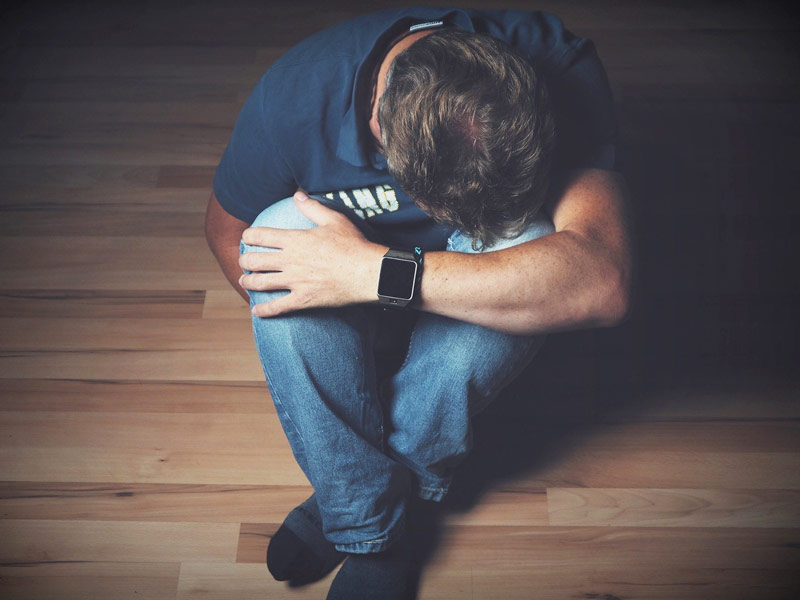
As humans, we tend to feel sad or ‘blue’ at times. However, being sad and being depressed are two distinct scenarios. In the former’s case, you feel sad for some time, but get better. On the other hand, in the case of depression, you remain in a low mood persistently for weeks if not months. Although many do not acknowledge it due to the associated stigma, it is a serious mental health issue that can interfere with a person’s daily life considerably and can hamper his/her work and family life. The worst-case scenario can even culminate into suicide, says the World Health Organisation (WHO). Just like any other disease, depression can be better treated if detected early. And for early diagnosis, one should know the early signs. And to know the same, Onlymyhealth spoke to Dr. Kriti Anand, Associate Consultant, Psychiatry, Paras Hospitals, Panchkula.
Table of Content:-
Early Signs Of Depression

(Photo Credit: Freepik)
Depression or major depressive illness is a mood disorder. Here are some of its symptoms as enumerated by Dr. Anand:
- Low Mood: While suffering from depression, you tend to remain in a low mood for days, if not weeks.
- Loss Of Interest: When depressed, people lose interest in activities they earlier enjoyed.
- Sleep Disturbance: A change in your sleeping pattern, which includes both under and oversleeping, is another sign of depression.
- Change In Appetite: While suffering from depression, the appetite of some people increases, which might lead to weight gain. For others, they experience a decrease in appetite, which leads to weight loss.
- Psychomotor retardation or agitation: Psychomotor retardation refers to the slowing down of a person’s thoughts and reduction in his/her physical activity, which is another symptom of depression. Agitation and irritability are the other signs you should watch out for.
- Negative Thoughts: When depressed, a person tends to be occupied with negative thoughts.
- Suicidal Thoughts Or Tendency: In 2020 alone, about 1.3 lakh people died of suicide in India. However, depression isn’t the only cause behind it. Also, it is an extreme symptom. However, it is crucial to note when dealing with this mental health condition, a person tends to have suicidal thoughts and can even display such tendencies.
Also read: What Is Psychotic Depression? Symptoms And Tips To Manage This Mental Illness
Other than these, here are some other symptoms of depression as enumerated by the WHO and the US Centers for Disease Control & Prevention (CDC):
- Fatigue and low energy
- Poor or lack of concentration
- The feeling of guilt and lack of self-worth
- Feeling anxious and or sad often or all the time
- Irritation, frustration, and restlessness
- The feeling of hopelessness about the future
So, these are some of the symptoms associated with depression. However, you must note that these are just symptoms and not the actual diagnosis for depression. A mental health expert can only help you with the diagnosis and will start the treatment accordingly.
On when a person should see a doctor, Dr. Anand said that the “symptoms of depression might get severe if left untreated.” Hence, if a person is feeling low or is losing interest in activities he/she used to enjoy, and this has persisted for over two weeks, then a doctor must be consulted. The same should be done if the person displays any suicidal tendencies.
Also read: Want To Know Your Risk of Depression? Watch Your Body Clock
Treatment For Depression

(Photo Credit: Freepik)
Depression is treatable. The treatment options include both therapy and medication.
Therapy
This is one of the ways to treat depression.
- Dr. Anand says that pharmacotherapy along with psychotherapy is the best treatment for depression.
- In therapy, the focus is on the person’s thoughts, feelings, and what is happening in his/her life.
- In this, the therapist sits with the patient to devise and learn skills and ways that help in coping with what is happening in life, changing behaviour and thought patterns that are causing trouble and finding solutions to the problems the person is facing.
- This generally lasts for a short time during which the patient has to open up to the therapist and understand the condition and learn coping skills and mechanisms.
Medication
There are many antidepressants available that can help a person with depression. However, you must not take these without the doctor’s recommendation, and if recommended you need to take this without failing. If you are concerned about the side effects, then you must share your concerns with the doctor who can inform you better and can help you with the treatment. Another thing that must be noted is that once you start feeling better, you must not stop these without your doctor’s advice. Follow the expert’s instructions throughout the treatment.
Thus, depression is a serious mental health issue that can have a prominent impact on a person’s life. However, if diagnosed early, it can be treated promptly. For that, one must take notice of any signs hinting at depression. If you experience any of those, you must consult a psychiatrist who can help you with the diagnosis and treatment.
(With inputs from Dr Kriti Anand, Associate Consultant, Psychiatry, Paras Hospitals, Panchkula)
Photo Credit: Pixabay
Also watch this video
How we keep this article up to date:
We work with experts and keep a close eye on the latest in health and wellness. Whenever there is a new research or helpful information, we update our articles with accurate and useful advice.
Current Version
